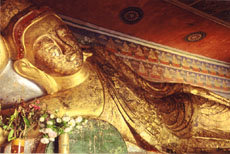|
The Timing
Theravada
Buddhist tradition has adhered to the assumption that the Historical Buddha passed
away during the nigh t of the full moon in the lunar month of Visakha (which falls
sometime in May to June). But the timing contradicts information given in the
sutta, which states clearly that the Buddha died soon after the rainy-season retreat,
must likely during the autumn or mid-winter, that is,November to January. A
description of the miracle of the unseasonal blooming of leaves and flowers on
the sala trees, when the Buddha was laid down between them indicates the time
frame given in the sutta.Autumn and winter, however, are seasons that are not
favorable for the growth of mushrooms, which some scholars believe to be the source
of the poison that the Buddha ate during his last meal.

Diagnosis
The sutta tells
us that the Buddha felt ill immediately after eating the Sukaramaddava. Since
we do not know anything about the nature of this food, it is difficult to name
it as the direct cause of the Buddha's illness. But from the descriptions given,
the onset of the illness was quick. While eating, he felt there was something
wrong with the food and he suggested his host have the food buried. Soon afterward,
he suffered severe stomach pain and passed blood from his rectum. We can reasonably
assume that the illness started while he was having his meal, making him think
there was something wrong with the unfamiliar delicacy.
Out of his compassion
for others, he had it buried. Was food poisoning the cause of the illness? It
seems unlikely. The symptoms described do not indicate food poisoning, which can
be very acute, but would hardly cause diarrhoea with blood. Usually, food poisoning
caused by bacteria does not manifest itself immediately, but takes an incubation
period of two to 12 hours to manifest itself, normally with acute diarrhoea and
vomiting, but not the passage of blood.
Another possibility is chemical poisoning,
which also has an immediate effect, but it is unusual for chemical poisoning to
cause severe intestinal bleeding. Food poisoning with immediate intestinal bleeding
could only have been caused by corrosive chemicals. But corrosive chemicals should
have caused bleeding in the upper intestinal tract, leading to vomiting blood.
None of these severe signs are mentioned in the text.
Peptic ulcer diseases
can be excluded from weight loss, growth or mass in the abdomen the list of possible
illnesses as well. In spite of the fact that their onset is immediate, they are
seldom accompanied by bloody stool. A gastric ulcer with intestinal bleeding produces
blackstool when the ulcer penetrates a blood vessel
An ulcer higher up in
the digestive tract would be more likely to manifest itself as bloody vomiting
not a passage of blood through the rectum
Other evidence against this possibility
is that a patient with a large gastric ulcer usually does tint have an appetite.
By accepting the invitation for lunch with the host, we can assume that the Buddha
felt as healthy as any man in his early 80s would feel. Given his age we cannot
rule out the Buddha did not have a chronic disease, such as cancer or tuberculosis
or a tropical infection such as dysentery or typhoid which cold have been quite
common in the Buddha's time.
These diseases could produce bleeding of
the lower intestine depending on their location.They also agree with the history
of earlier his illness during the retreat. But they can be ruled out since they
are usually accompanied by other symptoms such as lethargy, loss of appetite,
weight loss; grow or mass in the abdomen. None of these symptoms were mentioned
in the sutta. A large hemorrhoid can cause severe rectal bleeding, but it is unlikely
that a hemorrhoid could cause severe abdominal pain unless it is strangulated
But then it would have greatly disturbed the walking of the Buddha to the house
of his host, and rarely is hemorrhoid bleeding triggered by a meal.
Suite
l'article (3/4)
|